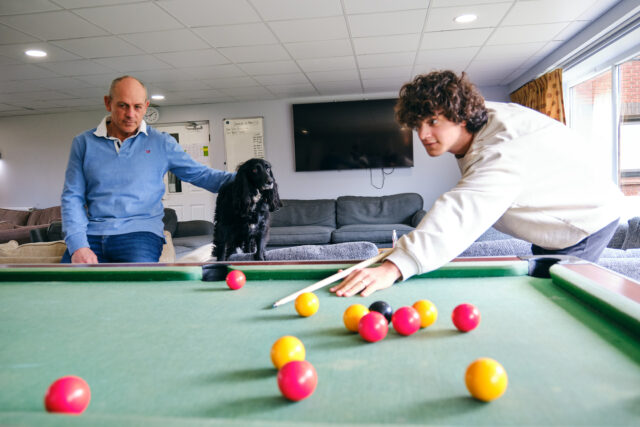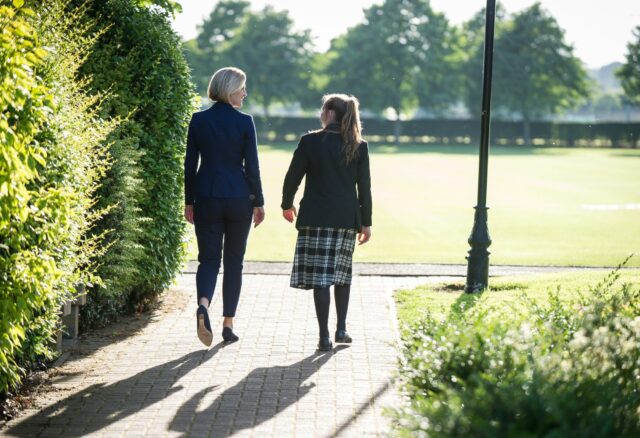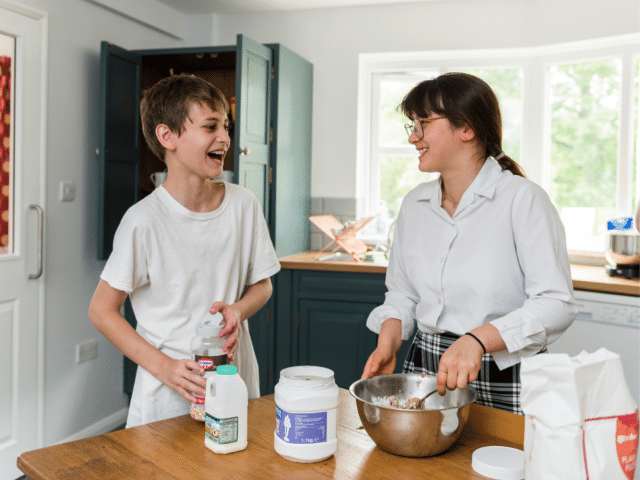Our community of boarding and day pupils is led by our Heads of School and other Decem members. Hear what they and other Oakhamians have to say about life at Oakham, either as a boarder or day pupil.
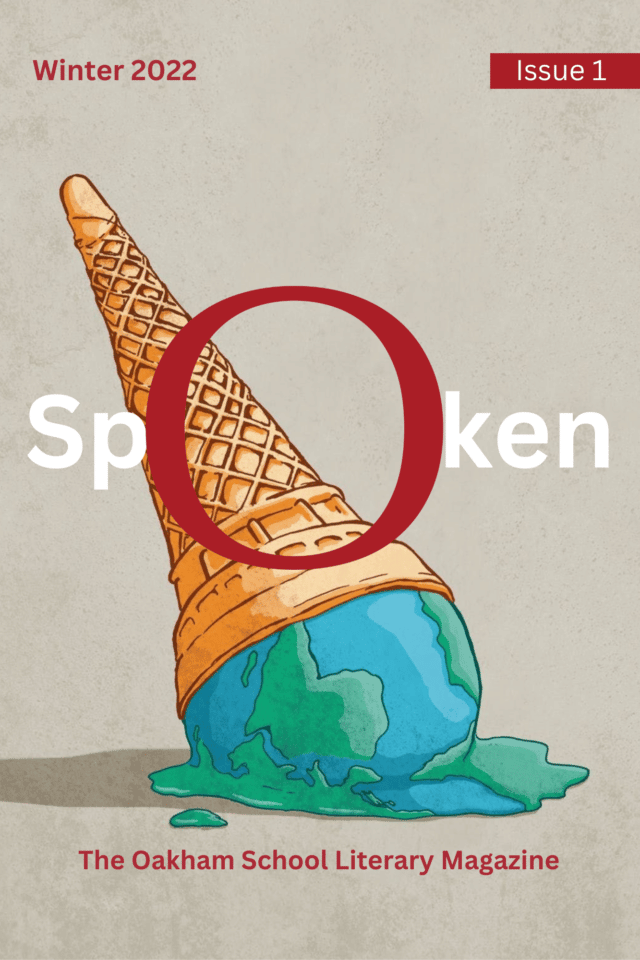
The Editors of SpOken

The Editors of SpOken
Seventh Former Annalise and Sixth Formers Zeme, Theo and Lucas are the editors of SpOken, a literary magazine filled with creative writing by Oakham School pupils.
Here they reflect on the process of creating a new magazine from scratch.
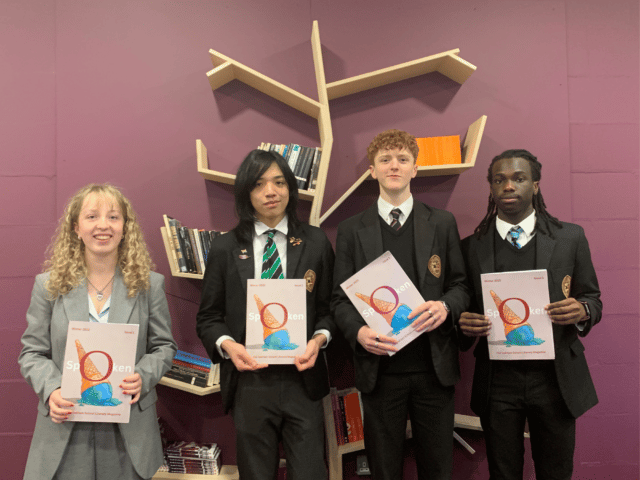
Editorial Designer Annalise recalls seeing the activity description in the Upper School Activities booklet: “I always hoped there would be an activity like this, as I would like to study in this field.”
Deputy Editor Lucas explains why he chose the activity: “I’m very interested in writing and also wanted to get experience of editing and proof reading.”
The first editorial meeting – Associate Editor Theo
“At the first meeting Dr Reddy set out the aims of the magazine. Basically our principal aim was to display and showcase the creative writing from all the pupils at Oakham.”
“I researched what roles that an editorial team in a magazine would usually have, and we chose the roles that we felt suited us best and reflected what were already doing as a group.”
“We were unsure how many submissions we would receive, so we brainstormed ways to incentivise pupils to send in their contributions.”
“We liked the idea of offering a physical prize to encourage pupils to send in their writing and thought that would be most appealing to pupils.”
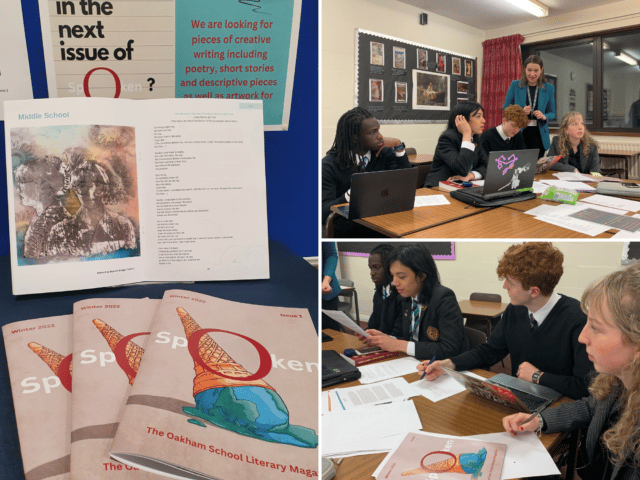
“I was surprised and impressed with the quality and quantity of the writing. I had originally expected that we would receive only a couple of pieces outside of the poems that Form 1 had done as their homework, but, in fact, there were a healthy number of contributions from other years.”
“The majority of submissions, by far, were environment-related poems submitted by Form 1. Of those, we chose a selection and tried to showcase pieces from every year group to ensure a fair representation of everyone in the School.”
“Furthermore, we attempted to ensure a diverse range of topics so readers would not only have pieces about climate change to choose from.”
“We discussed several ideas about the ordering and organisation of the pieces in the magazine, including by genre, form, or topic. In the end, for simplicity’s sake, we decided to group them by year group, which has the added benefit of each pupil’s work being easily located within the magazine.”
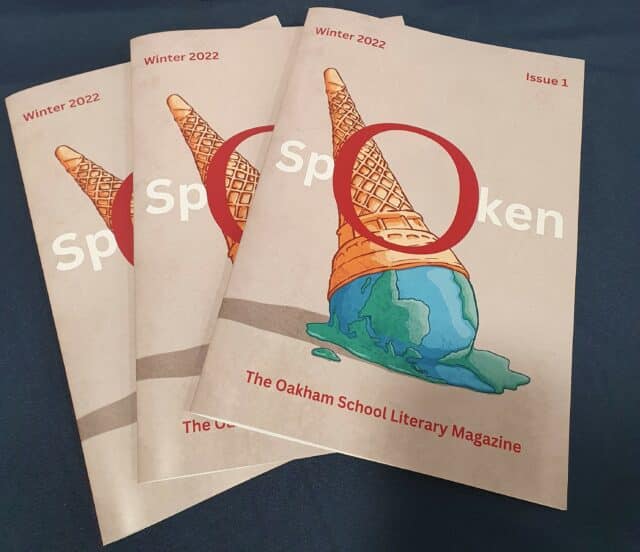
“I chose the image due to its representation of climate change, which was a popular theme for our Lower school writers.”
“I felt that its message was relevant to today’s world and the issues facing our generation. Visually, I had tried more abstract ‘arty’ selections but decided the ‘melting world cone’ was more striking and poignant.”
“We wanted the magazine to be noticeably linked to the School, but we also wanted it to stand up on its own as something different.”
“Above all, we wished to produce something that was created by students, that students could identify with, and that contained their ideas and creations.”
“That’s where we came up with the capital ‘O’ within the magazine title to represent the School’s logo.”
Naming the magazine – Editorial Designer Annalise
“When deciding the name, the team were just brainstorming one Friday afternoon and had ideas like E16 (the name of the classroom where the activity is held) and Merton (the name of the building).
“We ended up landing on the name “SpOken” and felt it matched perfectly, both as a reflection of the content of the magazine and the ‘o’ sound mirroring the School’s name.”
Launching the magazine – Deputy Editor Zeme
With Issue 1 of SpOken out now, Deputy Editor, Zeme, outlines how the team plans to keep the momentum going.
“We are celebrating the launch of SpOken by getting the magazine seen by as many Oakhamians as possible. There’s an amazing exhibition in the library promoting the magazine and we are aiming to launch a few competitions to encourage more writing.”
“We will also be handing out prizes at the end of term assemblies to the contributors whose work the other editors and I have voted as the being the most impressive.”
Future editions – Deputy Editor Zeme
“Issue 2 should be coming out by the beginning of the of the Summer Term and every subsequent issue will also come out at the beginning of term.”
“We want Issue 2 to incorporate more types of writing from all of the different year groups. While the first issue is dominated mostly by Lower School pieces, we hope Issue 2 gets more submissions from pupils in the Middle and Upper School.”
“We are also hoping for even greater variety in the types of writing that pupils send through. Anything would work!”
If you would like to see your work included in a future magazine, please email Dr Reddy at eer@oakham.rutland.sch.uk”
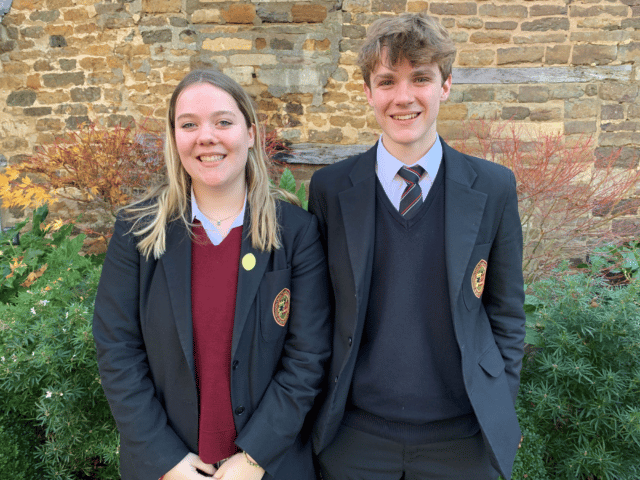
Sophie and David

Sophie and David
Two pupils at Oakham School have been sharing their stories of how ableism has affected their lives to help educate their peers on neurodiversity and inclusivity.
As a topic that isn’t currently widely covered in the curriculum, Sophie and David, both Form 6 (Year 11), were given the opportunity to lead a recent Upper School Assembly with their talk: Neurodiversity and Ableism – Our stories, and why they’re important.
Here, they addressed the apprehension people can have when talking to someone who is neurodiverse and educated their peers and staff members on how they can help to spread kindness and awareness.
The duo said: “When doing this presentation, we set out to educate everyone on words they should avoid and how they shouldn’t talk in ways which reflect neurodiversity negatively.”
“It can be hard when we hear words that reflect the differences of a neurodiverse person negatively and isolate them, and the most saddening part of this is people’s lack of awareness in the language they use, and this means that we feel the burden of the hurtful things they say.”
The presentation
After receiving a House tutorial on Diversity and Inclusion, Sophie noticed a gap in the session in the form of neurodiversity and ableism.
She said: “I spoke to my Tutor and our Assistant Head of Upper School to say that I’d really like ableism to also be covered in our school and to talk to my peers about why it isn’t OK to use particular language. The aim was to give pupils more of an understanding of why they should be thoughtful and aware to people with disabilities.”
Sophie, whose brother has Down’s Syndrome, was then invited to present in an Upper School Assembly and enlisted the help of her friend, David, who has a brother with Autism and Hydrocephalus.
David said: “We were incredibly nervous about giving the talk to our peers, but it was also very exciting to help raise this awareness. It’s such a personal issue for both Sophie and myself, and I don’t think we’d ever made ourselves that vulnerable before, so this only added to the value and realism of what we were doing.”
Personal experience
David said: “Growing up with an older brother who has Autism and Hydrocephalus has meant that I have had to grow up incredibly fast in order to help him as much as possible. I have had to realise that my duty is to look out for him and help him remain able to thrive because I am not neuro diverse.”
“We told pupils that as children we sometimes wondered what it would be like to have a sibling relationship not too dissimilar from those of them with typical siblings. But we are not ashamed of our brothers, our relationship is different, and that doesn’t mean it is any worse than any other typical relationship, it is special, and they are our brothers and that is important to us.”
During their presentation, the duo aimed to create an incredibly vulnerable moment where they talked about how ableism has affected their families and how this issue is personal to them. This was met with a shocked reaction from their audience, some of whom might not have considered the impact their words can have on the family of a neurodiverse person.
Sophie said: “You do hear words which are quite hurtful, and I think people use them without thinking about the impact they can have because they think it’s funny and that they’re joking around.”
“I hope that the talk inspires people to think a bit more before they say something that might be upsetting to someone else.”
Growing up with a neurodiverse sibling
Sophie: “To me, Jack is so normal and I feel like it would take a couple of conversations to realise that he has a disability so I would love people just to be open minded and have a normal conversation with him.”
“If you do make a mistake when talking to someone like Jack, he honestly wouldn’t mind and speaking as a family member, we would just be so happy and grateful to you for trying and for making an effort.”
During the presentation, the duo talked about the fact that despite James and Jack being their older brothers, they have always felt the need to protect them from any forms of unkindness and struggle. This is because they are both vulnerable to sarcasm or any other forms of deceptive behaviour as a result of their neurodiversity; so, from a very young age, they understood that they were different and special.
The fear of the unknown
When reviewing what might make people apprehensive when talking to a neurodiverse person, Sophie and David cited the fear of the unknown as the biggest factor.
Sophie said: “People can be apprehensive about talking to a neurodiverse person because they might have a fear of saying something wrong, so this may then stop them from trying in the first place.”
“I would like people to know that even if they do say something wrong, as long as they don’t have bad intentions, then it doesn’t matter. People will appreciate the effort and know that it’s coming from a good place.”
Sophie and David plan to present their talk on neurodiversity and ableism to staff members and Middle and Lower School pupils in the near future.
Sophie added: “We’re so grateful to the school for giving us this opportunity. Ableism and diversity haven’t been treated like a tick box exercise at Oakham School, and we really feel like we were listened to when we raised the topic as being missing.”
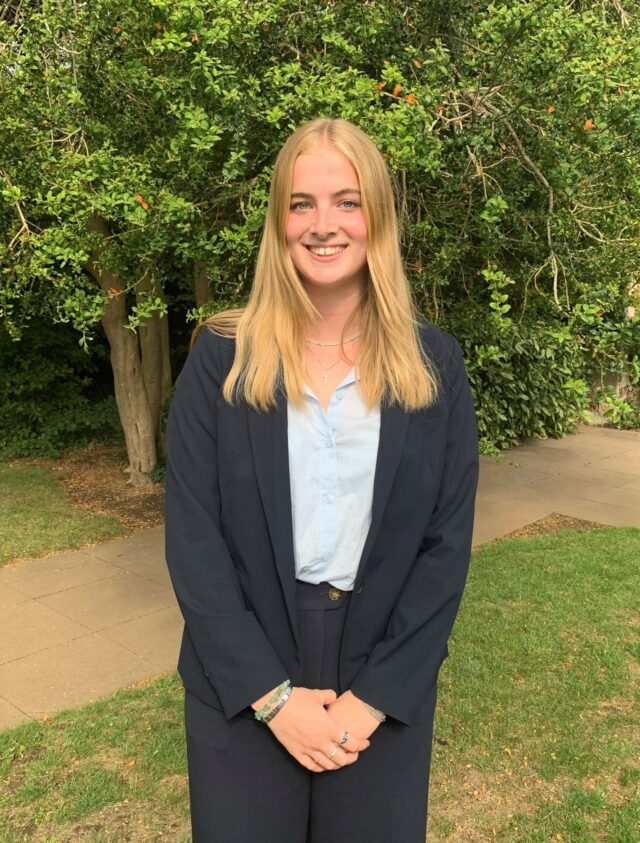
Poppy

Poppy
I am delighted to have been appointed Head Girl this year. I joined the School in Stevens House in 4th form. My first two years at Oakham were somewhat interrupted by two lockdowns and online learning, but that didn’t stop me from building long lasting friendships and enjoying school life. This year will only be my second ‘normal year’ at Oakham, but it certainly doesn’t feel that way.
I study Religion and Philosophy, French and Spanish at A-level, and hope to study languages in the future. My subjects are so eye-opening and allow me to experience so many different cultures and points of view. As well as my academic work, I spend a lot of time playing the flute and singing. The support and encouragement I have received at Oakham has enabled my confidence to grow immensely over the last 3 years, and I have enjoyed performing solos in concerts over the last year.
One of my favourite things about Oakham is the opportunities it presents you with, and during my time as Head Girl, I hope to encourage and inspire others to make the most of these opportunities.
My advice this year and for the future is to take pride in everything you do, whether that’s playing for the 1st team or the 4th team, it doesn’t matter. Any contribution you can make is something to be proud of, so I urge anyone to get out there and seize those opportunities.
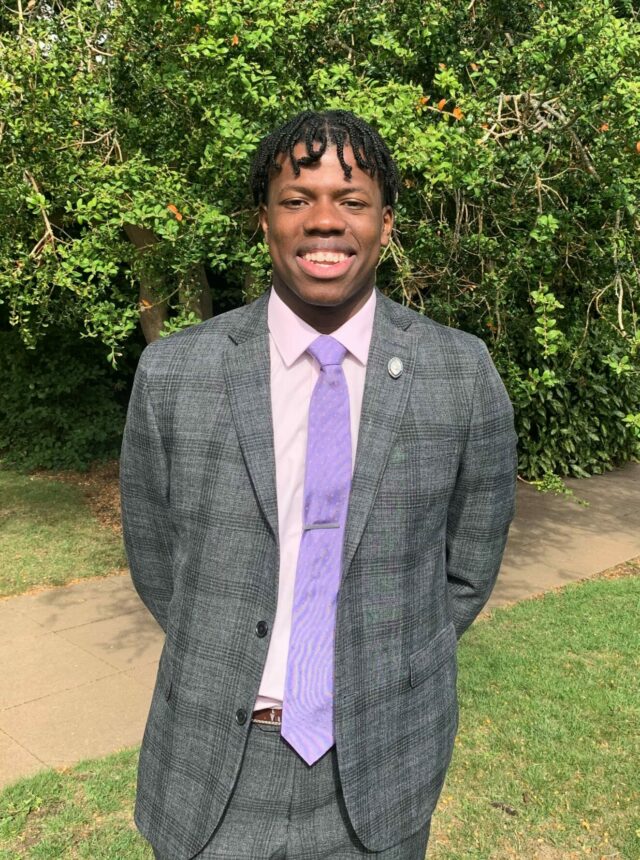
Obi

Obi
I am honoured to be Oakham’s Head Boy this academic year. I am excited at the opportunity to make a positive impact in the place that has helped me grow so much. Alongside the Decem, I hope to help continue the momentum of unity within the school after the disruption caused by the pandemic.
I first joined Oakham in 3rd form as a full boarder in Haywoods House, having moved from Maadi British International School in Cairo, Egypt. The change from a small day school to a school like Oakham was unnerving. However, I was quickly grateful to be a full boarder because it made the change to such a big school less intimidating; the constant support of the friends and teachers in residence quickly made me feel less alone. Vital to my time at Oakham has been the comfort of being part of Haywoods.
I study Maths, Further Maths, Physics, and Philosophy at A-Level, and I hope to go on to read Engineering at university level. Outside of academics, I enjoy participating in sports. My favourites include rugby and athletics, but I am lucky to have played among friends in a variety of sports at a range of levels. I am also fond of music (especially playing the piano), and it is through the support and encouragement of the music department at Oakham that I have developed as a musician, with a greater sense of self-belief that bodes positively for future life. I feel fortunate to have had such encouraging coaches and teachers over the years, and I now see immense value in co-curricular life as it is in these activities that I find my fondest memories and proudest achievements.
What I love most about Oakham is its approach to all aspects of the curriculum. No matter the interest, no matter the level, I have always felt supported by teachers and coaches in my endeavours. My advice to every Oakhamian would be to take advantage of this, and immerse themselves in any way they can because you can never know that you enjoy something until you try it. Only by stepping out of your comfort zone will you discover your character.
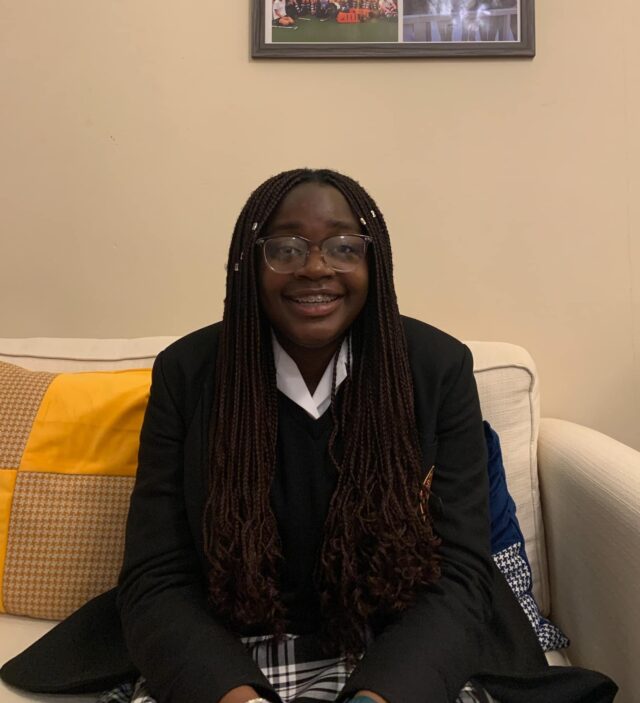
Iwinosa's Boarding Bio

Iwinosa's Boarding Bio
Oakham School is providing a behind-the-scenes look at a UK boarding school with its interview series, The Boarding Bios.
Form 3 (Year 9) pupil Iwinosa joined this academic year having previously been at school in her home country of Nigeria. Whilst boarding wasn’t a new concept to her, there were many changes for her to adapt to when she moved to Oakham School.
“Boarding here is giving me so many experiences I never would’ve had back home in Nigeria”
“When I first thought about coming to England to a boarding school it felt a bit weird as it wasn’t something I’d done before, but it’s strange now, because I don’t feel like I’ve been homesick at all since arriving here.”
“I mean, of course I miss my family and my home in Nigeria but it’s not like I’m scared or anxious; I feel very at ease at Oakham School.”
Boarding in England has proven very different to the schools Iwinosa has been to in Nigeria.
“I’ve boarded ever since I started secondary school, but before Oakham this had all been in Nigeria. The boarding house I was previously in was really fun but very different from here.”
“We all lived in flats out there and each room would fit about 12 pupils in it. Sharing that closely with 11 other girls could definitely be challenging at times. Being in Buchanans now is really different because we’re all together in one House but have rooms of two or three people which is really good to have a bit more privacy.”
“Boarding has always been a very normal thing for me. I wouldn’t say everyone does it in Nigeria, but a lot of friends I know also boarded, so it wasn’t a strange concept for me at all.”
“It’s been really nice coming to school here, because everyone has been really welcoming and is very friendly to me.”
Whilst there are many things to take in when moving to England, Iwinosa has found the weather to be one of the biggest changes.
“It’s of course been quite different coming to England having grown up in Nigeria. The culture is very different, but the weather is especially surprising. I actually saw hail for the first time recently and I’ve still never seen snow – but I’m sure I will do at some point soon!”
“When it was hailing, I was really shocked, because I’ve only ever seen it happen in movies and it’s very odd to think of ice falling from the sky.”
“It’s always hot in Nigeria, so it’s strange to go from living somewhere so consistent to coming here where the weather is unpredictable.”
Iwinosa has been able to try things she’s never done before.
“This year is the first time that I’ve ever played hockey, which was really fun. There’s no hockey in Nigeria at all, so it was really interesting to learn more about it and give it a go. I’d only really heard of ice hockey before and didn’t know you could do field hockey.”
“The first day I played I didn’t know what was going on at all. I didn’t have a hockey stick or any shin pads, but the School supplied me with the right equipment and I was shown how to dribble the ball.”
“I’m not the best at playing hockey at all, but I’m still learning and I’m getting better.”
Outside of the timetable, Iwinosa is also enjoying all of the activities available at Oakham School.
“We recently did karaoke in our House and it was so much fun – I like to joke that I’m a pretty good singer now actually. There are so many things that you can do at the School outside of class time, so you never get bored.”
“We’ve also been out on trips with other Houses and recently went to Rutland Water for a long walk with another Girls’ House. We also recently went to Leicester Outdoor Pursuits to have a go at the wall climbing, which was really fun but I was so scared doing it!”
Along with adapting to a new culture and the charming British weather, Iwinosa has noticed a big change in the diet of people in England.
“I’ve noticed that people eat a lot of pasta here. Especially in the Barraclough Dining Hall, pasta is really popular and people love it. In Nigeria the food is very different but in comparison we eat a lot of rice. The food is a lot less spicy over here, so it’s harder to get used to.”
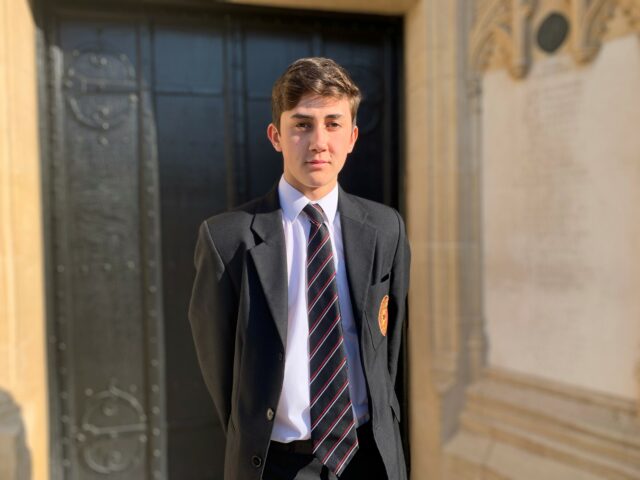
Samuel's Boarding Bio

Samuel's Boarding Bio
Finding the benefit of having more time at School for his prep and friends, Form 6 (Year 12) pupil Samuel shares his story on his transition from day pupil to flexi-boarder.
After joining the School in Form 3 (Year 9) as a day pupil, Samuel spent one year travelling to and from School each day before realising the boarding lifestyle was better suited to him.
Samuel found that flexi-boarding allowed him to do more at School.
“I felt that as a day pupil, I was getting home quite late in the evening because my family live near Market Harborough, so I wasn’t getting much time to do my prep work.”
“Also, by going home each evening I knew there were loads of exciting activities still happening at the School which I didn’t get to be a part of, so there was the social, fun element to consider as well.”
“When I weighed up what I was missing out on academically and socially, I knew that being a boarder was the right thing for me so had a discussion with my parents and luckily here I am now!”
Before coming to Oakham, Samuel didn’t know much about boarding at all.
“I was actually quite nervous about sleeping at School because the thought of it was quite daunting to me.”
“However, when I saw how close some of my friends were and how much of a good time they had, I knew it was something I wanted to try as it definitely made me want to join in with them.”
Now Samuel is a boarder, he has really close friendships with a lot of his peers.
“My friends are definitely the best part about boarding. You all get to really know and understand one another because of the time you spend together and we’re a really close year group.”
“You can talk to anyone if you have a problem and you always know that someone is around to listen, so whilst we all have a lot of fun, our friendships run really deep.”
Samuel soon settled into the boarding lifestyle.
“It was quite strange on the first few nights of boarding because you’re sleeping at School and you don’t have your family around you anymore.”
“I found that after a couple of days it was quite easy to settle into boarding life because the routine we have is very similar to what I would have at home and there are so many people around you that you feel comfortable really quickly.”
Samuel likes the flexibility of being able to go home at the weekends.
“I don’t think there’s a reason in particular I don’t fully board, as I’m sure it would be fine if I did, but it is really nice to go home at the weekends and have that time with my family.”
“I think the flexibility in our House is really good because there will be odd occasions when there are events happening and we can request to stay over all weekend as well, but it’s nice having a good balance of School and home life.”
Whilst there are many enjoyable things about Oakham, Sport is still a favourite for Samuel.
“I particularly enjoy doing sport at Oakham. I think the facilities are really good and the coaching is great.”
“My favourite sport is hockey but I also enjoy rugby and cricket. There’s lots of opportunities here for sport because you can do sport during the School day as well as during your free time.”
“There are also quite a few opportunities to do other activities and for my Service option I do CCF which is really cool. As part of this, we do RAF training and I’m really interested in flying and aircraft.”
“I also really enjoy the independence you get at the School as you move up the year groups. You get the freedom to get on with your own work but can still go to your tutors or teachers if you’re struggling.”
Alongside sport… the food at Oakham is also a big hit.
“Because of the amount of sport I do… there’s a lot of eating that goes alongside it.”
“The food in the Barraclough Dining Hall is really good. The go-to for me is always the pasta bar, because even there there’s so many options to choose from.”
“But to be honest, I just like all of the meals – it’s quite good and I was very surprised by the variety.”
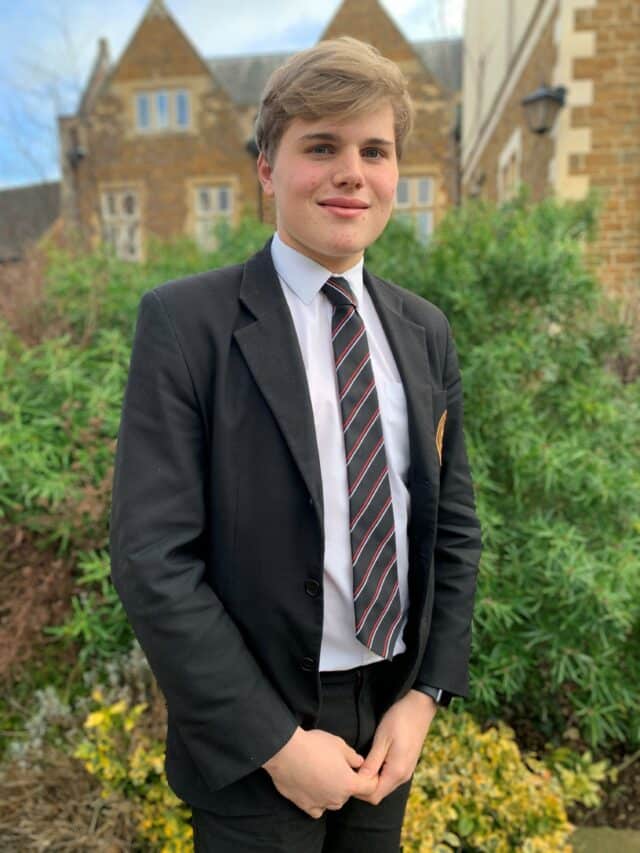
Daniel - Volunteering Opportunities with LOROS

Daniel - Volunteering Opportunities with LOROS
Creating Volunteering Opportunities with LOROS
I recently took part in an inaugural Life project with fellow Form 6 pupils Katrina and Ansh in partnership with local care hospice LOROS at Uppingham School.
LOROS is a hospice that focuses on palliative care and its work is essential for many people needing end of life care in Leicestershire and Rutland. The Life project wanted to create an opportunity for young people across Leicestershire and Rutland to take leadership in problem solving and imaginative solutions to one of four proposed challenges.
Each team was made up of around five people from schools across the counties and were given the task of thinking of a creative solution to present to a panel of judges. We attended an online ‘crash course’ led by an international university on possible ways to approach our challenge. The problem I was hoping to find a solution for was how charities like LOROS can recruit and utilise volunteers more effectively.
In short, our solution was to create a new opportunity that also focuses on the ingenuity of the younger generation by setting up a volunteering platform which nurtures an atmosphere for teenagers to develop their skills through volunteering by going through a tier-based system that rewards vital volunteering in the local communities.
The first time I met with the other members of my team, in person, was the day of the presentation, where the resounding response to my initial introduction seemed to be a comment on how they didn’t expect me to be as tall as I was.
The day was a huge success for all involved, with our hard work throughout the past weeks culminating with my team being announced as the team with the best solution. This was a fantastic achievement and has led to more amazing opportunities.
At the beginning of the summer term, I was invited, along with my team, to the main LOROS hospice for a tour and to discuss the possible implementation of our solution. This was a hugely positive meeting and a brilliant insight into the work of the hospice, and we took significant steps forward with a clear aim to make our solution a real possibility.
Following this meeting, our team were faced with our next challenge, an online presentation of our idea to the volunteering steering committee of LOROS. The supportive voices of the committee fuelled our collective desire to make plans for bringing in our idea to the hospice. We are now our planning to spend a few days in the hospice over the summer piloting our idea.
This experience has given me a new perspective on how young people can drive substantial change and how we can help the community we live in as much as possible. I strongly believe that Oakham School has the correct atmosphere for projects like this and I hope I can work to create a project that allows the pupils at Oakham to engage with the community and use their skills in order to bring about positive change.
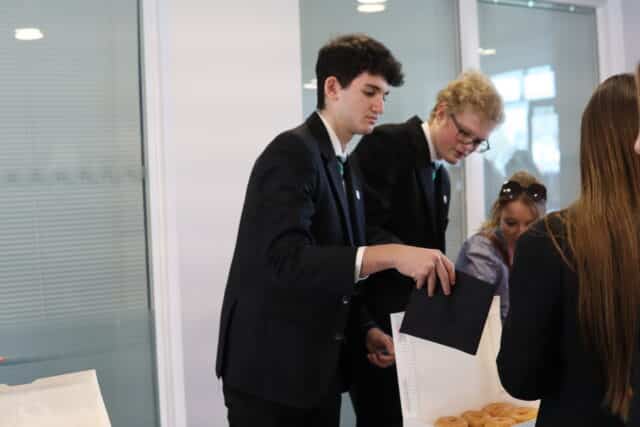
Sargon - Uniting for Ukraine

Sargon - Uniting for Ukraine
Uniting for Ukraine
Currently, we are experiencing a terrible situation in Ukraine and it is crucial to unite at this time to support this cause in any possible way. This is why we gathered a small group of sixth formers to somehow relate to this issue and raise awareness throughout Oakham School.
We initiated this with a sale of doughnuts and badges with Ukrainian and Russian flags on them to symbolise unity and the need to support each other at this very moment. The sale went pretty well and we are planning to sell the remaining badges during Speech Day at the end of this half term. All of the money raised will be donated to the Red Cross which will then distribute those donations to support Ukrainian refugees who are struggling to find places to live.
At the beginning of March, I took part in the MUN conference in Bath, an activity which sees students discuss real-world issues. I was given an amazing opportunity to give a speech in front of the 400+ audience at the end of the conference. I prepared the speech related to the situation in Ukraine, which generally described the appalling events that had been happening in certain regions at that time. The speech was aimed to raise an awareness by giving a general understanding of the situation, as I had access to the Ukrainian media and was better informed about the actual issues.
It was extremely difficult to focus on anything during the first few weeks when the actions have taken place in my own country, especially because I had just started the school term. However, there were some people who were nice to me and empathetic, including the staff within the School, who showed their support. Since the beginning of this ongoing conflict in Ukraine I have constantly tried to talk to people, both online and in person, to raise awareness and provide an understanding of the situation, so that their attitude towards this could become deeper and more serious.
Oakham School is very engaged in charitable projects and it was an amazing opportunity to introduce the charity sale for the Ukrainian cause. It was a real pleasure for a Ukrainian citizen to see students in this school wearing those badges to support the cause.
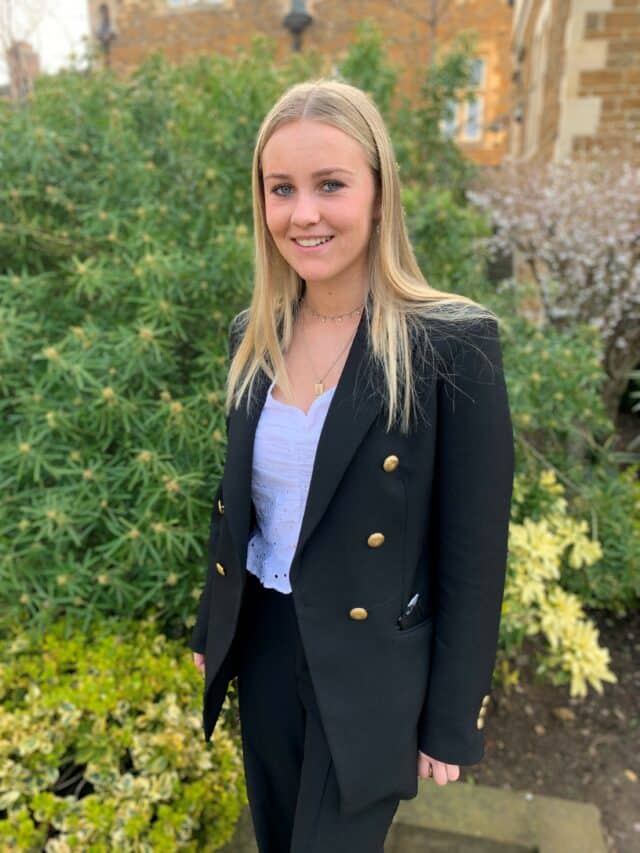
Jess - Behind the BTEC

Jess - Behind the BTEC
With BTECs available to study in both Business and Sports Science at Oakham School, Form 7 pupil Jess has benefited from both qualifications throughout her time in the Upper School. She shares her experiences of doing assignment-led projects and talks about why this has benefited her way of learning.
Why did you choose to do a BTEC?
I like that with the BTEC you are able to see the grades you are attaining alongside the grades you’ve already achieved so you can easily keep track of your progress. The BTECs also include lots of coursework which suits me better than exams and helps me to achieve the highest grades that I am able to reach.
What other subjects are you studying?
I study both BTEC programmes, double sport and exercise science along with a single BTEC business. Both these subjects are effective at getting me into my university of choice and doing the course I would like to get on, dependent on end results.
How do you think your BTEC supports your learning?
I think BTEC suits me as it has a clear structure and you know what levels you are achieving through coursework results and exam results. Both the Sports Science double award and Business BTECs are effective at getting me into my university of choice and doing the course I would like to get on.
What are your favourite things about the BTEC?
My favourite things about BTECs are the structure of learning and doing an exam or piece of coursework and then not having to do it again unless you choose to retake units. It gives a sense of relief and allows you to focus on what you are learning and your next topic rather than worrying if you fully understood what went on last year as you have already got a grade and don’t need to revisit the work prior to the next exam as it doesn’t include previous topics content.
What have you learnt so far in your BTEC?
I have not only learnt content within sports science and business but I have learnt life skills too. BTEC has helped me to improve my written work, organisation and time management. As you have a lot going on at once and lots of deadlines that need to be met. In a BTEC you also learn practical skills along with academic for example in business we are doing interviews and practising our skills for the future and in sports science, we are doing coaching developing the skills and qualities that a successful coach should display.
What are your future career goals?
I am hoping to study Agriculture with Farm Business Management at Newcastle University after I have taken a gap year where I am hoping to go travelling with some friends.
How do you think the BTEC will help you achieve your future career goals?
I believe it has set me up well for university and the real world as you have to use time management and organisation to ensure you achieve your end goal as you do tasks you complete them and move on. You balance your time and meet deadlines which is similar to university.
Find out more about Learning at Oakham School.
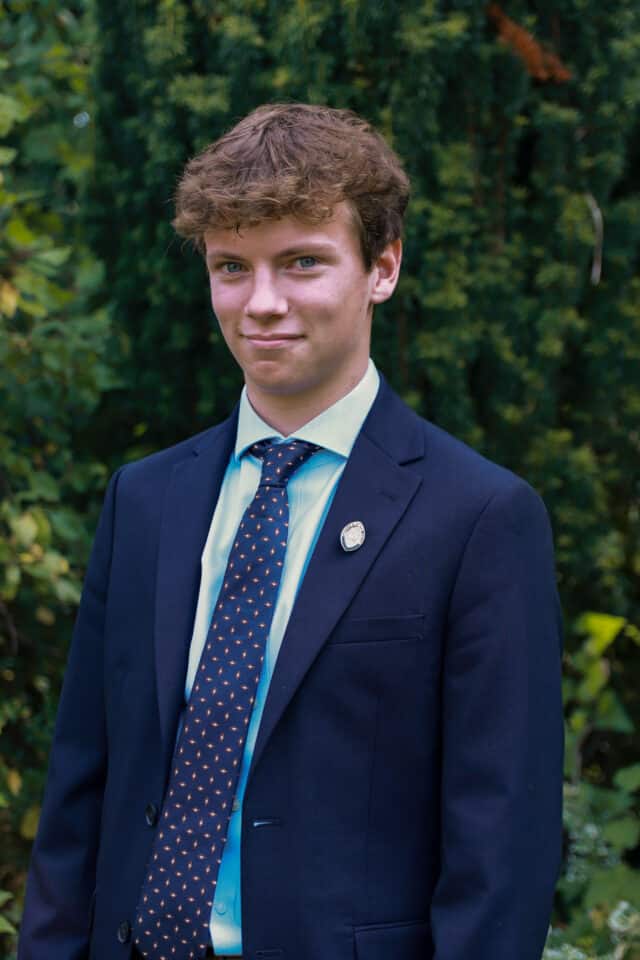
James - Behind the BTEC

James - Behind the BTEC
Behind the BTEC: Qualification gives budding Pilot the right tools to take flight
In the launch of a new campaign, ‘Behind the BTEC’, Oakham School is exploring how pupils across its Upper School are taking advantage of this qualification. Offered alongside A-levels and the IB Diploma, BTECs provide pupils with a different approach to learning, and can be a suitable fit for those looking to achieve certain career goals.
We caught up with Form 7 pupil James on how studying a Business BTEC course has helped him get into flight school.
Please tell us more about your pursuit to becoming a Pilot.
“Next year I am going to flight school and starting my journey as a pilot. Doing the BTEC helped my application, as I was able to show my interest in the industry in the interview process as I chose an airline as my chosen business for the coursework modules.”
Why did you choose to do a BTEC?
“I decided to do the BTEC Business course as it played to my strengths compared to A-level Business. The BTEC offers a more modular format with exams and assessments throughout the course. This allows for more of a guarantee of grades as well as pressure slightly eased in the exam season sitting two A-levels rather than three.”
James is also studying History and Geography at A-level and doing the BTEC has allowed him to focus on these subjects especially during the mocks and going into the exams in the summer.
How has the BTEC supported your learning?
“It provides a much wider range of knowledge in the subject as well as going into more depth than the A-level and in a more practical and hands-on way.”
How has it helped you improve your skills?
“So far, my skills in time management and organisation have improved massively due to tight coursework deadlines and this has filtered into my other subjects benefiting them as well. I have really enjoyed learning about recruitment in certain businesses as well as learning about how businesses operate on a day-to-day basis allowing for their success.”
“As well as this, being able to do assessments throughout helps guarantee certain grades and helps encourage more ambitious targets, therefore improving my results and having massive advantages in life after Oakham.”
What’s your favourite thing about the BTEC?
“My favourite thing is being able to select the business that you look at for coursework modules, therefore increasing your own knowledge about a business or industry which could also be useful in the future.”
“Doing BTEC Business has also helped me demonstrate my ability to work to deadlines and to be target driven, which is what the flight school selection panel wants to see in applicants and what the BTEC offers to all students.”
Find out more about Learning at Oakham School.




